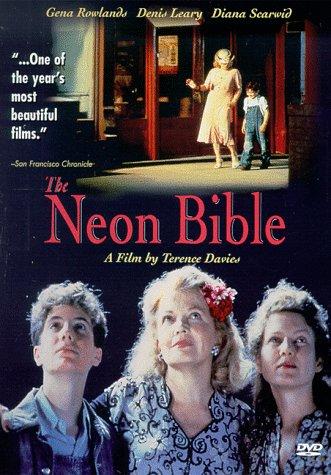
NEON BIBLE, THE
(director/writer: Terence Davies; cinematographer: Michael Coulter; editor: Charles Rees; cast: Gena Rowlands (Aunt Mae), Diana Scarwid (Sarah), Jacob Tierney (David, at age 15), Denis Leary (Frank), Leo Burmester (Bobbie Lee Taylor), Frances Conroy (Miss Scover), Peter McRobbie (Reverend Watkins), Drake Bell (David, at age 10); Runtime: 91; Artificial Eye/Mayfair/Scala/Channel 4; 1995-GB)
“An old-fashioned type of coming-of-age film shot by the Englishman, Terence Davies.”
Reviewed by Dennis Schwartz
An old-fashioned type of coming-of-age film shot by the Englishman, Terence Davies (DistantVoices, Still Lives). It is adapted from a semi-autobiographical book written by John Kennedy Toole, depicting him as a teenager in the ’50s, which was written for a national literary contest. It tells of a Southern boy named David (Tierney) and of his growing up poor and uneducated in the ’40s in a rural and backward area; and, the strange hold his harsh father (Leary) and weak-minded mother (Diana) have over him. It also tells about his meaningful relationship with his visiting Aunt Mae (Gena). She is a former actress/singer. The women try to provide different insights from the harsh realities facing him, so that this gentle soul can find his own way in the world.
When this slow-moving film works and it often does, it is artistically satisfying to behold. David is seen alone in the opening shot riding away from town in a train, going somewhere unknown.
The next time we see David is in the flashback when he was a 10-year-old (Drake) hoping for a Christmas snow, but getting rain and magical-looking icicles on his porch instead. What perks David up is the ebullience of his Auntie Mae, who does not fit into this Bible Belt region. She prefers to dress and act in the style of her showbiz past, and is therefore loudly chastised for her appearance and sinful attitude. When one lives in such a place where conformity counts for everything, then one either tries to fit into town or leaves. To stay and fight the locals will only ensure you a heap of trouble.
Because the aunt and David do not fit in with the locals, this leads to their closeness and dependence on each other. But they are forced to change as their lives change, and this affects the sensitive David the most. He is not ready for these changes. David grows up as a loner (unable to communicate with his racist and scornfully pious father, who is also a wife beater). He is, also, unsure of himself with girls and with making friends his age. He goes to work full-time at the age of 15, in a pharmacy, and seems to be going nowhere fast.
Sarah gets overcome with the misery and dull routines of her life, and becomes mentally unbalanced. We see her lose a grip on reality while she is attending one of those religious revival meetings. Soon afterwards she becomes half-baked, unable to function in the house without the help of Aunt Mae. She is, also, worried about how the family will get by with her husband unemployed from his factory job.
Aunt Mae will meet a local musician and team up with him professionally and romantically, and soon she leaves town with him. That leaves David with no choice but to quit his job and take care of his incapacitated mother, or else she would be taken away to the mental hospital. That is something he is dead set against. This leads to the tragic event that causes David to get on the train and hightail it out of there.
Terence Davies’ camera focuses for the longest possible time on the local scenery, on Sarah hanging out the laundry, on the home-folks going about their business, a KKK meeting his father takes him to, Aunt Mae singing “My Romance” slightly off key; and, in the background, we can hear a radio speech by FDR, an episode from the Gang Busters radio program, music such as “Dixie” and “This Old Rugged Cross” and “Chattanooga Choo Choo”, sung by the local talent. We become absorbed in the national and local events taking place during that time period and see how it influenced the youngster growing up.
The film ends abruptly without a summation of what might happen to David, as the train David is on is crossing the countryside in early dawn and the shot is framed against an optimistic sky of yellows, oranges and pinkish blues.
How this child grew up during that period of transitional Southern history, in a climate of racial bigotry and Christian hypocrisy, in a family with obvious economic and psychological problems sets the mood for this dramatic story. It is this child’s insightful look at the world and at himself, and what changes David and forces him to grow up before he is ready to, that makes this film emotionally impactful.
The cinematography was beautifully done. Gena Rowlands was impressive in a subtle performance. Jacob Tierney as David, gave his character softness and breath in a laconic performance. The only problem I have with his performance is that he seems to be too nonchalant about his life becoming so tense. I found that hard to fathom that he is not more frightened to be alone on that nighttime train, going to who knows where.
This film is not Davies’ best effort; but, it is a solid and honestly done film that was well-researched and presented. It offered an interesting observation about the rural South not often filmed, as most of the time redneck life is done with less tact and with less of an artistic touch.
REVIEWED ON 3/8/99 GRADE: B